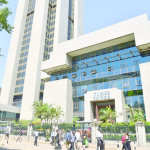The U.S. is seeking to “lower tensions” in the Middle East, according to the country’s ambassador to the UN, amid concerns about a potential Iranian retaliatory attack on Israel. On Tuesday, Linda Thomas-Greenfield addressed the UN Security Council in New York, stating that the U.S. aims to “deter and defend against any future attack and prevent regional conflict.”
Concerns have been raised that Iran may retaliate against Israel following the assassination of Hamas leader Ismail Haniyeh in Tehran in July, a responsibility Israel has not claimed. U.S. President Joe Biden suggested that achieving a ceasefire deal between Israel and Hamas in Gaza might deter Iran from attacking Israel.
“That’s my expectation, but we’ll see,” he remarked to reporters while departing a plane in New Orleans, Louisiana.
A new round of ceasefire negotiations is scheduled for Thursday, likely in either Doha or Cairo. However, Hamas official Ahmad Abdul Hadi has reportedly stated that Hamas will not participate in the talks, according to reports from the New York Times and Sky News.
Additionally, U.S. Secretary of State Antony Blinken has postponed his trip to the Middle East to engage in negotiations aimed at ending the Gaza conflict. International mediators from the U.S., Egypt, and Qatar are advocating for a ceasefire agreement that would facilitate the release of Israeli hostages to their families and allow Palestinian civilians to return to their homes.
In related news, Washington has approved a $20 billion arms sales package to Israel, though the delivery of these arms will take several years. During the Security Council meeting in New York, Thomas-Greenfield called for a finalized ceasefire deal.
“A wider regional conflict is not inevitable,” she stated. “The United States’ primary objective is to lower tensions in the region, deter future attacks, and prevent regional conflict.” She emphasized that achieving this begins with finalizing an immediate ceasefire deal that includes the release of hostages in Gaza. “We need to get this over the finish line.”
However, Palestinian Ambassador to the UN Riyad Mansour criticized the Security Council for its inaction regarding Israel’s military operations in Gaza. “Wake up. Stop making excuses.
You cannot reason with the Israeli government to halt the killing of thousands of civilians, imposing famine, torturing prisoners, colonizing, and annexing our land while merely appealing to them,” he asserted.
Israeli Ambassador Gilad Erdan countered that Hamas employs civilians as human shields in Gaza. Israel initiated a military campaign in Gaza to eliminate Hamas following an unprecedented attack on southern Israel on October 7, which resulted in approximately 1,200 deaths and 251 hostages taken. Since then, more than 39,920 individuals have reportedly died in Gaza, according to the Hamas-run health ministry.
Additionally, hundreds have been killed in ongoing clashes between Hezbollah and the Israeli military along the Israel-Lebanon border since the conflict began. Amid intense international diplomatic efforts to ease tensions, Iran on Monday dismissed calls from the UK and other Western nations to refrain from retaliating against Israel for Haniyeh’s assassination.
While Israel has not confirmed its involvement in Haniyeh’s death, it has heightened its military alert level. The U.S. has warned of preparations for “a significant set of attacks” by Iran or its proxies possibly occurring this week and has increased its military presence in the Middle East to assist in defending Israel.



